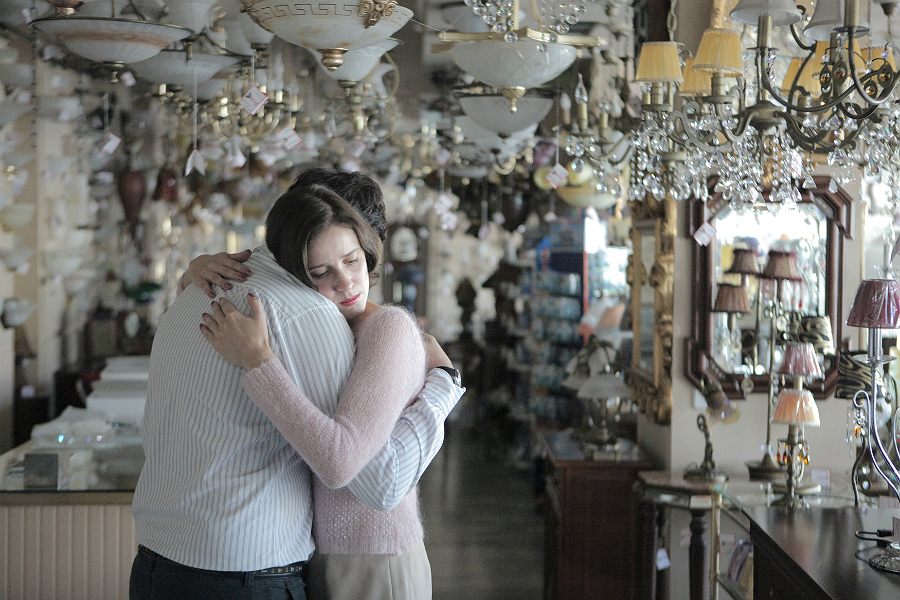Alps and the new Greek Cinema

DW Mault on Giorgos Lanthimos, a man in the vanguard of the new Greek Cinema…
Uncertainty and unease are very much to the forefront of the cinema of Giorgos Lanthimos: a dreamlike essence of terrifying stasis and superstructures that are the remains of a post-capitalist world that holds only sorrow and mystery. After Dogtooth, Lanthimos has entered further into this dark forest and beckoned us to follow; he is our Virgil, our soothsayer and ultimately our father.
Alps takes place in contemporary Greece, a lonely stagnant place that, if anything, resembles a post-communist East European city state: one that is dying and has looked further rightwards to a warm comforting fascist future. A place where the streets are empty, emotion is to be hidden because of its danger of falsifying subjective truth, and the populace looks to sport to affirm their existence. When danger is faced, all you are left with is the dishonesty of the bread and circuses that striving for physical purity over intelligent discourse gives you.
Greek cinema, after the death in January of Theo Angelopoulos (Trilogy: The Weeping Meadow), is in rude health; whether the aforementioned Giorgos Lanthimos, Athina Rachel Tsangari or new kid on the block Ektoras Lygizos, it’s a different cinema and a different Greece projected than the one Angelopoulos knew and shared. Not for Lanthimos, Tsangari or Lygizos the stately austere historical treaties that looked inside grand events for the hard humanity that forced through these times to show both on a micro and macro level that we must endure in spite of our surroundings, and the totalitarian knowledge of history; they are far more interested in the internal rather than external.
Their cinema is NOT a comment on Greece, bailouts, the World Bank and the shock of financial austerity; it is a warning from history of recent times, and those times being so closely aligned to fascism and the perils of a military dictatorship. The question they ask is of how we continue in the face of lunacy, in the daily fight against a dying society when everything is a commodity and we are left with the broken down bodies of the defeated.
Alps is a more difficult film than Dogtooth. It’s more enigmatic and mysterious (in Freud’s idea of the uncanny, rather than a generic sense), and this means it’s more divisive because it appears not to follow the rules of present reality, but nor does it follow logical narrative progression. While watching Alps for the first time it appeared to me to be a modest failure and step backwards for Lanthimos but afterwards it wouldn’t leave me, and I achieved a mental domino effect that caused me to go back to the film and its parallels of dream space and moral emptiness. It’s a film that has stayed with me and whose images and actions float in and out of my subconscious in a manner that tells us we have participated in something special.
According to Lanthimos, Alps tells the story of “a group of people who agree to stand in for the lost loved ones of others, replicating their behavior and gestures, ostensibly to help with grieving.” Adds the director, “It’s mainly about death and substitution in a way. If you can substitute people that have died with other people and how difficult that can be. It involves the stories of many people, and I guess it has similarities with Dogtooth in its tone, because it’s quite dark as well, but is also funny and violent. It’s contradictory, like Dogtooth is.”
There you have it, the ‘plot’, straight from horses mouth, I would argue the less you know the better, as Alps is a cinematic enema. A necessary medicinal attack against answers, a primal scream that knows the pain of existence and how society is composed, contained and imposed upon by brutal means. This is a film that knows there is no hope on the other side of despair, how we are all isolated and our ever fluid identity destabilised to the point of meaninglessness. An empty space devoid of human contact where the powerful abuse their powers and we continue to be complicit in this abuse.
To say that Alps is bleak is of course a massive understatement, but it’s bleak in an oblique manner. It’s as erotically blissful as a dream we’ll never have; as well as showing us the minor potential for self expansion within constricted negative space. How the answer may be a choice between a self forced mental breakdown that allows escape, or the unquestioning of unified fulfillment.
So go and see Alps and enter in the conversation that your subconscious will have with your present reality, and be thankful and always aware that comfort is a self denying state that will only be broke when you’re ready for POP (throughout the film, the question ‘Are you ready for POP?’ is frequently asked). I’m ready…
DW Mault
Alps screens 6pm @ FACT tomorrow as part of Discover Tuesdays





